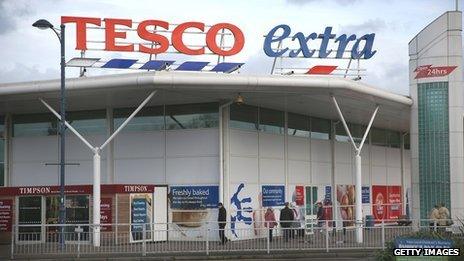Tesco - jam tomorrow?
- Published
- comments

One word leaps out of Philip Clarke's statement in Tesco's annual results - "sharper". He is talking about pricing but he is careful not to use the word "lower".
Maybe that is deliberate. Mr Clarke thinks that customer loyalty is not only driven by what an item costs. He thinks loyalty can also be driven by deals such as higher fuel discounts the more customers spend.
Some analysts, such as Louise Cooper, are sceptical. She questions whether Tesco has actually done enough on price to really move the needle for customers. A chilling statistic from a Retail Week survey yesterday was that 45% of 2,000 adults questioned thought that Tesco's prices had gone up in the last year.
Only 13% thought they had come down. Aldi and Lidl are likely to be laughing up their collective, nicely tailored German sleeves at that answer.
The question investors will be asking is "has Philip Clarke grasped the nettle" on the fundamentally changing retail market?
Investors have expressed "frustration" to me at the pace of change, pointing to the fact that the fall in like-for-like sales and profit margin squeeze accelerated in the final quarter of the year. Introducing restaurants to stores and selling iPad-style tablets appear, to some, to be marginal issues.
Mr Clarke has brought in greater capital discipline, which is welcome, a far better European distribution model and is still, of course, running a very profitable business. He is also in the right place on multi-channel distribution - the ability to buy Tesco products on any platform or in store.
He will now need to show how he is going to take the battle to the discounters which are slowly but steadily eating Tesco's lunch. In the end, that will be about how much the retailer invests in bringing down prices.
The danger for Mr Clarke is that he finds himself in no-man's land, neither a discounter nor a retailer that can ride the "quality" wave that has lifted Waitrose so rapidly. Mr Clarke says Tesco can be for everyone - but that general message may be hard to get across.
Tesco also has a problem of market saturation - there aren't that many parts of the UK (where Tesco creates 66% of its profits) that don't have a Tesco. That is unlike Asda and even Sainsbury's which can build market share by simply building shops.
There is no groundswell of opinion running against Mr Clarke at the moment among the investors I have spoken to. For each of the Big Four supermarkets, these are challenging times. A sobering thought is that Britain, with the arrival of Aldi and Lidl, is in a position of over-supply. Declining like-for-like sales, falling profits and lower margins may be something we are all going to have to get used to.